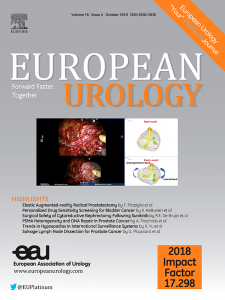European Association of Urology Guidelines on Renal Cell Carcinoma: The 2025 Update
IF 25.3
1区 医学
Q1 UROLOGY & NEPHROLOGY
引用次数: 0
Abstract
Background and objective
The European Association of Urology (EAU) renal cell carcinoma (RCC) guideline panel has updated their evidence-based guidelines and recommendations for the management of RCC. Here we present a summary of the 2025 RCC guidelines updated with standardised methodology to provide reproducible evidence for the management of RCC.
Methods
For the 2025 update, a literature search was performed covering the period from May 1, 2023 to May 1, 2024 using the Medline, EMBASE, and Cochrane Libraries. The data search focused on meta-analyses, systematic reviews, randomised controlled trials (RCTs), and retrospective or controlled comparator-arm studies. Evidence was synthesised as outlined for all EAU guidelines.
Key findings and limitations
Clinical practise recommendations were updated in all chapters of the RCC guidelines on the basis of a structured literature search. The studies included were predominantly retrospective with matched or unmatched cohorts based on single- or multi-institutional data. Several prospective studies and RCTs provided data that resulted in recommendations based on higher levels of evidence. Specifically, updates include new recommendations on stereotactic body radiotherapy for localised RCC, adjuvant therapy, systemic therapy for clear-cell RCC in later lines, other subtypes, and a new chapter on hereditary RCC.
Conclusions and clinical implications
The 2025 RCC guidelines have been updated by a multidisciplinary panel of experts using methodological standards to provide a contemporary evidence base for the management of RCC.
欧洲泌尿外科协会肾细胞癌指南:2025年更新
背景和目的欧洲泌尿外科协会(EAU)肾细胞癌(RCC)指南小组更新了RCC治疗的循证指南和建议。在这里,我们提出了2025年RCC指南的总结,更新了标准化的方法,为RCC的管理提供可重复的证据。方法对于2025年的更新,使用Medline、EMBASE和Cochrane图书馆检索2023年5月1日至2024年5月1日的文献。数据检索主要集中在荟萃分析、系统评价、随机对照试验(rct)和回顾性或对照比较组研究。证据是按照EAU所有指南的概述进行综合的。在结构化文献检索的基础上,RCC指南的所有章节都更新了临床实践建议。纳入的研究主要是基于单一或多机构数据的匹配或不匹配队列的回顾性研究。一些前瞻性研究和随机对照试验提供了基于更高水平证据的建议。具体而言,更新内容包括针对局部RCC的立体定向体放疗、辅助治疗、后期系透明细胞RCC的全身治疗和其他亚型的新建议,以及关于遗传性RCC的新章节。结论和临床意义一个多学科专家小组使用方法学标准更新了2025年RCC指南,为RCC的管理提供了一个现代的证据基础。
本文章由计算机程序翻译,如有差异,请以英文原文为准。
求助全文
约1分钟内获得全文
求助全文
来源期刊

European urology
医学-泌尿学与肾脏学
CiteScore
43.00
自引率
2.60%
发文量
1753
审稿时长
23 days
期刊介绍:
European Urology is a peer-reviewed journal that publishes original articles and reviews on a broad spectrum of urological issues. Covering topics such as oncology, impotence, infertility, pediatrics, lithiasis and endourology, the journal also highlights recent advances in techniques, instrumentation, surgery, and pediatric urology. This comprehensive approach provides readers with an in-depth guide to international developments in urology.
 求助内容:
求助内容: 应助结果提醒方式:
应助结果提醒方式:


